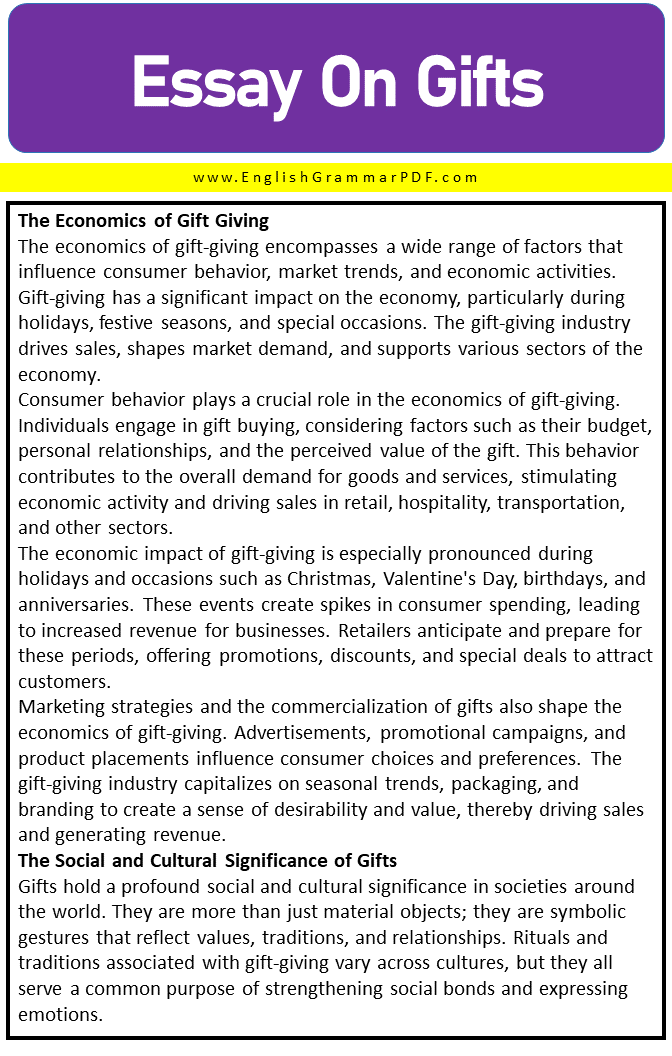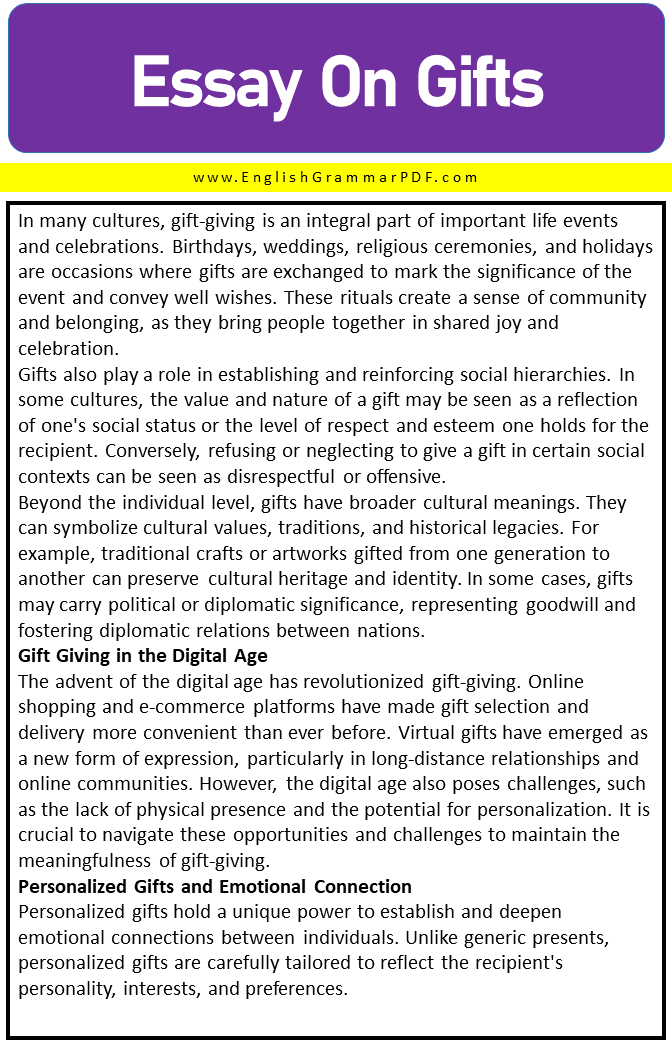Essay On Gifts
Outline of Essay:
- Introduction
- Psychological Aspects of Gift Giving
- The Economics of Gift Giving
- The Social and Cultural Significance of Gifts
- Gift Giving in the Digital Age
- Personalized Gifts and Emotional Connection
Introduction
Gifts hold a significant place in human interactions and have been an integral part of societies throughout history. This essay aims to explore the various dimensions of gift giving, including its historical perspectives, psychological aspects, economic implications, social and cultural significance, the impact of the digital age, ethical considerations, the emotional connection of personalized gifts, and the future of gift giving. By delving into these aspects, we can gain a deeper understanding of the importance of gifts in human relationships and society.
Psychological Aspects of Gift Giving
Psychological aspects of gift-giving delve into the motives, emotions, and interpersonal dynamics involved in the act of giving and receiving gifts. This dimension of gift exchange sheds light on the deeper psychological and emotional significance behind this common human practice.
The act of giving gifts satisfies fundamental psychological needs. It allows individuals to express emotions such as love, gratitude, appreciation, and affection towards others. Giving a gift provides a tangible way to communicate and strengthen personal relationships. It creates a sense of connection and fosters bonds between the giver and the recipient.
Similarly, receiving gifts also elicits psychological responses. It can generate feelings of happiness, surprise, and gratitude. Gifts act as tangible symbols of thoughtfulness and care, validating one’s worth and importance to the giver. Receiving a gift can enhance self-esteem and reinforce positive emotions in the recipient.
The Economics of Gift Giving
The economics of gift-giving encompasses a wide range of factors that influence consumer behavior, market trends, and economic activities. Gift-giving has a significant impact on the economy, particularly during holidays, festive seasons, and special occasions. The gift-giving industry drives sales, shapes market demand, and supports various sectors of the economy.
Consumer behavior plays a crucial role in the economics of gift-giving. Individuals engage in gift buying, considering factors such as their budget, personal relationships, and the perceived value of the gift. This behavior contributes to the overall demand for goods and services, stimulating economic activity and driving sales in retail, hospitality, transportation, and other sectors.
The economic impact of gift-giving is especially pronounced during holidays and occasions such as Christmas, Valentine’s Day, birthdays, and anniversaries. These events create spikes in consumer spending, leading to increased revenue for businesses. Retailers anticipate and prepare for these periods, offering promotions, discounts, and special deals to attract customers.
Marketing strategies and the commercialization of gifts also shape the economics of gift-giving. Advertisements, promotional campaigns, and product placements influence consumer choices and preferences. The gift-giving industry capitalizes on seasonal trends, packaging, and branding to create a sense of desirability and value, thereby driving sales and generating revenue.
The Social and Cultural Significance of Gifts
Gifts hold a profound social and cultural significance in societies around the world. They are more than just material objects; they are symbolic gestures that reflect values, traditions, and relationships. Rituals and traditions associated with gift-giving vary across cultures, but they all serve a common purpose of strengthening social bonds and expressing emotions.
In many cultures, gift-giving is an integral part of important life events and celebrations. Birthdays, weddings, religious ceremonies, and holidays are occasions where gifts are exchanged to mark the significance of the event and convey well wishes. These rituals create a sense of community and belonging, as they bring people together in shared joy and celebration.
Gifts also play a role in establishing and reinforcing social hierarchies. In some cultures, the value and nature of a gift may be seen as a reflection of one’s social status or the level of respect and esteem one holds for the recipient. Conversely, refusing or neglecting to give a gift in certain social contexts can be seen as disrespectful or offensive.
Beyond the individual level, gifts have broader cultural meanings. They can symbolize cultural values, traditions, and historical legacies. For example, traditional crafts or artworks gifted from one generation to another can preserve cultural heritage and identity. In some cases, gifts may carry political or diplomatic significance, representing goodwill and fostering diplomatic relations between nations.
Gift Giving in the Digital Age
The advent of the digital age has revolutionized gift-giving. Online shopping and e-commerce platforms have made gift selection and delivery more convenient than ever before. Virtual gifts have emerged as a new form of expression, particularly in long-distance relationships and online communities. However, the digital age also poses challenges, such as the lack of physical presence and the potential for personalization. It is crucial to navigate these opportunities and challenges to maintain the meaningfulness of gift-giving.
Personalized Gifts and Emotional Connection
Personalized gifts hold a unique power to establish and deepen emotional connections between individuals. Unlike generic presents, personalized gifts are carefully tailored to reflect the recipient’s personality, interests, and preferences. By incorporating elements that are meaningful and specific to the individual, these gifts demonstrate thoughtfulness, consideration, and a genuine understanding of the person receiving them.
The emotional impact of personalized gifts is profound. They evoke feelings of appreciation, warmth, and affection, as the recipient recognizes the time, effort, and thought put into creating or selecting the gift. Whether it’s a custom-made piece of jewelry, a photo album capturing cherished memories, or a monogrammed item, the personalization adds an extra layer of significance and emotional connection.
Moreover, personalized gifts often become keepsakes, treasured possessions that hold sentimental value. They serve as reminders of the special bond between the giver and the receiver, triggering fond memories and emotions each time they are encountered. The act of receiving a personalized gift not only creates an immediate emotional response but also fosters a long-lasting connection and a sense of being truly understood and valued.
Conclusion
Gifts have played a significant role in human society throughout history, serving as vehicles for communication, connection, and expression. This essay explored the multifaceted nature of gift-giving, from its historical roots and psychological motivations to its economic, social, and cultural implications. The digital age presents both opportunities and challenges for gift-giving, and ethical considerations should guide our choices. Personalized gifts foster emotional connections, and understanding future trends can help navigate the evolving landscape. Ultimately, the essence of gift-giving lies in its ability to strengthen relationships and convey sentiments, underscoring the importance of thoughtful and meaningful gestures in our interactions with others.
FAQ’s
What makes a gift special?
A gift becomes special when it is thoughtful and personalized, and shows that the giver has considered the recipient’s interests, preferences, and needs. The emotional connection and meaning attached to the gift make it truly special.
What is the main purpose of gift-giving?
The main purpose of gift-giving is to express love, appreciation, gratitude, or goodwill towards someone. It serves as a way to strengthen relationships, celebrate special occasions, and create a sense of joy and connection between individuals.
Download the PDF of the Essay:
Explore More Essays:







